time management
Time Management 时间管理
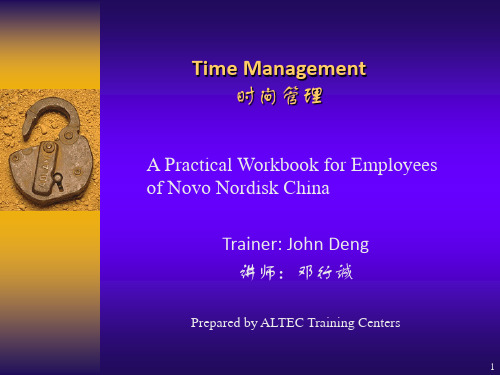
23
1.
Making List 列出清单
24
(to do list) Illustrations 每天的“执行事项清单” 图例
Date 日期:
order 次 序 Items 事项
今日主要目标:
Objectives time needed 所需时间 What time to deal with 什么时间 处理 Status of completion 完成情况 (Y或N)
34
五.
Developing good habits 培养良好的习惯
35
1. 5 - S Practice
五常法 --- The Key to Improve Your Quality and Productivity --- 改善品质及生产力的关键
36
5-S Practice 五常法
日语 Seiri 英语 Structurise 意义 常组织 例子 Clean up the trash 把垃圾清掉 Find the document you want within 30 second 30秒内就可找到要找的文 件 Responsibilities of personal hygiene 个人清洁卫生责任 Transparency of storage贮藏 的透明度 Apply the “5- S practice” Method 每天运用五常法
16
二. Scheduling Your Time
排好时间表
1.
Dealing with Deadlines 设立最后期限
17
2.
Setting Undisturbed Time 规定不受打扰的时间
18
3.
Tackling Large Tasks 解决大任务
Time Management时间管理

优先等级设定
有效沟通
给予、接受 反馈
冲突管理
时间对于我们意味着什 么? 我们的困境在哪里? 时间管理的正确含义? 做正确的事--目标与 计划 正确地做事--优先计 划管理
优先设定VS 时间管理
个人发展 行动计划
如果用一个词来描述你过去的 工作、生活状态,你最想用什么 词?
时间计划表
工作 起止时间 使用时间 优先顺序 备注
提高效率
管理自己
) 果断 )合理计划 ) 跟进计划 ) 专注力
管理他人
) 沟通
) 团队协作 ) 寻求帮助 ……
) 整合工作内容
) 划分出能自主支配的整块时间
) 利用零碎时间 ) 各时段工作状态 ) 守时 ) 整洁的工作环境 ) 避免拖延, 立刻去做
在开始工作之前,把所有你要用的东西准备好:避免工 作过程中出现不必要的停顿。 别让干扰和突然冒出来的想法打断你的工作。先把他们 记下来,回头再处理。
减少无谓的时间浪费
“ -”
帕金森定律:工作膨胀。事情 增加是为了填满完成工作所需 的多余时间
理解时间的规律:具体表现、建议
你在某件事情上所花的时间和你能用的时间成正比。
紧急:
这件事现在不做行不行? 会不会产生严重影响? 改天再做可以吗?
与上级沟通确认
练习:写出一天的工作内容并 设定优先次序
紧急 重 要 不 重 要
时间管理距阵
不紧急
练习:时间管理优化
将自己制定的优先顺序和小组分享 小组成为给出建议,评价自我认定的优先顺序是否合理 小组在每次轮换中
谢谢大家!
Time management

Another way to describe time management
• 以年为单位的时间管理 年 • To the unit in time management • 以天为单位的时间管理 天 • To-day management unit of time • 以小时 小时为单位的时间管理 小时 • In hours as a unit of Time Management
Three steps
• the first step in efficient time management is to organize the workspace or home. Even if one's schedule is well-ordered, but the office and filing system are a disaster, time will be wasted trying to work efficiently in a disorderly place.
Stephen Covey’s time management matrix
• 美国管理学家科维(Covey)提出的时间管理理 科维( 科维 ) 论(时间四象限法):把工作按重要( Important ) 和紧急( Urgent )两个不同的程度进行了划分, 大体分为4个象限(Four Quadrants ): • A.既紧急又重要(如客户投诉、即将到期的任务、 财务危机等) • B.重要但不紧急(如建立人际关系、人员培训、 制订防范措施等) • C.紧急但不重要(如电话铃声、不速之客、部门 会议等) • D.既不紧急也不重要(如上网、闲谈、邮件、写 博客等)
时间管理(Time Management)
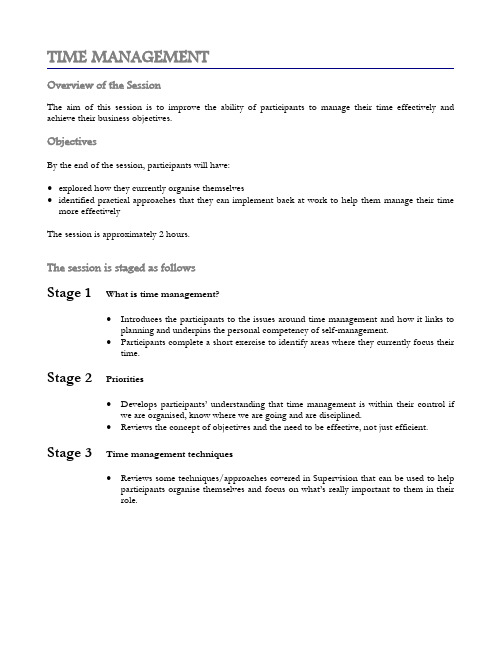
TIME MANAGEMENTOverview of the SessionThe aim of this session is to improve the ability of participants to manage their time effectively and achieve their business objectives.ObjectivesBy the end of the session, participants will have:∙explored how they currently organise themselves∙identified practical approaches that they can implement back at work to help them manage their time more effectivelyThe session is approximately 2 hours.The session is staged as followsStage 1What is time management?∙Introduces the participants to the issues around time management and how it links to planning and underpins the personal competency of self-management.∙Participants complete a short exercise to identify areas where they currently focus their time.Stage 2Priorities∙Develops participants‟ understanding that time management is within their control if we are organised, know where we are going and are disciplined.∙Reviews the concept of objectives and the need to be effective, not just efficient.Stage 3Time management techniques∙Reviews some techniques/approaches covered in Supervision that can be used to help participants organise themselves and focus on what‟s really important to them in theirrole.Stage 4Planning to take control∙Participants complete an exercise that forces them to analyze their job, barriers that get in the way of achieving it and creative solutions to help them overcome these barriers.∙Introduces the booklet 'Solving the 126 Commonest Time Problems'.Stage 1 – What is time management?Time management is probably the most popular training request. We are all busy, and it is fair to say that more is expected of us now than ever before, i.e. to produce more, of a higher quality, faster and with less people! So we all want some magic formula that will help us control the time we have available and not let it control us!If there‟s one certainty in life it‟s that there will never be any more time than there is - we can‟t change that fact - but what we can change is how we spend the time available to us. This session won‟t give you a magic formula or decrease your workload and, indeed, what it may make you realise is that if we can pro-actively manage ourselves, we can actually achieve more! It‟s about working smarter - not harder - and being effective, not just efficient.Time management is perhaps a misleading title as you can‟t manage time, but you can manage yourself, and how you choose to spend your time.To do this, we need to analyse how we are currently spending our time to see if we are focusing on the “right” areas.”“How I Currently Use My Time” (Exercise 1)Prepare flipchart and pen per person (participants to draw circles)Ask participants to consider how they spend their average day. Issue the exercise and ask each delegate to divide the circle into portions like a pie. Each piece of the pie relates to areas where they currently spend their time,For example:∙crisis management/fire-fighting∙in meetings∙training∙duty management∙working on my objectives∙etcParticipants to stick their circle on the wall and discuss them with the group.DiscussAre we spending our time in the right areas? Why not?EXERCISE 1 HOW I CURRENTLY USE MY TIMEName: ..............................................................Stage 2 – Priorities“Although other people will impact how we spend our time, at the end of the day much of it is down to us - it’s our choice. What we ne ed to ensure is that we’re choosing to spend it appropriately. To do this we need to understand what’s expected of us and know what we’re trying to achieve - again, it’s about having a purpose.”Facilitate a discussion on the above quotation.What do we have in the business that tells us where we are going?“Objectives - these will (if clear and well written) give us direction - we then need to plan and organise ourselves to achieve these, as well as completing the day-to-day tasks our jobs require which is not as easy as it sounds!”Why are objectives so important?“They are the things that drive the business forward rather than keep it ticking over. They are the things we are measured against and remembered for. No matter what your job title is, your key objectives will be those things designed to take the business forward. We refer to these objectives as "A" priorities.We can divide our working priorities into 3 sets - A's, B's and C's.Mark a flipchart into 3 columns.What are our A priorities?Examples include:∙Planning new restaurant concept∙Increasing occupancy/average rate∙Improving market share by x%∙Appraising staff, setting objectives with them, etcWhat are our B and C priorities?Examples include:∙Completing timesheets∙Sending memos∙Daily meetings, etcWhy is it more difficult to do our “A”s?Time, takes longer, getting down to it, overwhelming, big. B's and C's are easier as they tend to be quick - see an end result - satisfying and sometimes urgent, therefore must be done now.However the wrong type of hard work may kill your chance of achieving by deadening your senses to your priorities and objectives of your job.”If all you do is deal with B's and C's you might be efficient. If you deal with A's you are being effective and proactive. You will meet your objectives and move the business forward.It is important to remember that A's are often best approached in manageable chunks. When we leave them to the last minute they become stressful.Distribute Handout 1: Categories of Time Use.HANDOUT 1 CATEGORIES OF TIME USEAction can be broken down into five categories:1.Important and urgent2.Important but not urgent3.Urgent but not important4.Busy work5.Wasted time1. Important and UrgentThere are tasks that must be done, immediately or in the near future. Examples:a)Your boss demands a certain report by 10am tomorrowb)The exhaust on your car blowsc)You‟ve just received the reminder to pay your …phone bill and are due to be cut off any dayUnless these situations all develop simultaneously, you can cope with them. Because of their urgency and their importance, they take precedence over everything else, and procrastination, if a factor, is no longer possible. It is not here that there are time management problems.2. Important but not UrgentTasks normally fall into two categories - important and urgent. The important, positive tasks are the ones you must do to achieve the objectives of your job - our A priorities. The urgent tasks are all the jobs that land on you every day and have to be dealt with to keep things running, the B and C priorities. The dangers - and this is the trap in which most disorganised managers are caught up - is that you will spend all the available time on urgent tasks, coping with day-to-day jobs, and no time on the important tasks.So it is vital to be as ruthless as you can with yourself in categorising your “to do list” and only allocate positive task status to those jobs which help you to build the business and achieve the objectives of the organisation.3. Urgent but not ImportantThose are our B priorities, the jobs that need immediate attention, but that we would assign a low priority if we examined them objectively. For example, someone asks you to give a presentation or attend a meeting. You might consider each of these a low priority, but someone is standing in front of you waiting for an answer. You accept because you can‟t say no. Then, because these tasks have built-in time limits, they get done, while important items get moved down the list.4. Busy WorkThere are many tasks which are marginally worth doing but are neither urgent nor important- our C priorities. We often do them ahead of more important things because they are diversionary - they provide a feeling of activity and accomplishment while giving us an excuse to put off tackling those important tasks which have far greater benefit.5. Wasted TimeThe definition of wasted time is subjective. Television viewing, for example, can be time well spent if we come away feeling that we have been enlightened or entertained. But if, afterwards, we feel that the time could have been better spent mowing the lawn, playing tennis or reading a good book, then we can chalk up that time as wasted.People who scramble madly to get control of their time often look in vain for things in this category upon which to blame their inefficiency. However, with most people, this is not where the problem lies. It lies with allocating too much time to urgent, busy work, and not enough time to important work.It’s no longer enough to do t hings right (efficiency)We must also do the right things (effectiveness)Stage 3 – Time Management TechniquesIn Supervision we examined a 5 step approach to time management:1.Plan to plan2.Prioritise your tasks3.Exploit your body clock 'peaks'4.Control non-urgent interruptions and time wasters5.Assign and delegateLet's spend the next 10 minutes reviewing each of the steps.1.Plan to planIn order to meet our objectives we need to plan what we will do and when. We need to make time in our work schedule for planning, however difficult this may be. Find somewhere quiet to sit, divert your phone and make sure you are only interrupted in an emergency.2.Prioritise your tasksWe have just examined setting A, B and C priorities to each of the tasks we must complete.Use simple tools:A diary - a planning record and a log of what we have actually doneA to do' list - decide A,B andC priorities as well as which tasks you will assign or delegate.3.Exploit your body clock 'peaks'Everyone has peaks and troughs of energy throughout the day. We can increase our effectiveness by taking advantage of the most productive times of the day. For example: it is best to tackle our A priorities during our high energy or 'peak' time of the day.4.Control interruptionsIt is surprising how much of our day is take up with non-essential interruptions to our day. Later in this session we will consider creative solutions to time wasting problems as part of an ALT exercise.5.Assign and DelegateAssigning and delegating work to others not only frees you time; it also provides useful practise for the person who does the work for you.Stage 4 – Planning to take Control“Taking Control” (Exercise 2 - 60 Minutes)We will have the opportunity now to really analyse how we spend our time and identify if we are focused on achieving what we want and need to do in our jobs.We will identify:∙what our job is and what gets in the way of achieving it∙creative solutions for managing our personal timeExplain:The first stage of the exercise is completed individually (30 minutes), then each person will share what they have learnt about themselves and what they want to do differently with their ALT, and then a representative from each group will present the key points back in the main session.EXERCISE 2 TAKING CONTROLComplete the five points individually. Then join with your ALT to share what you have learnt about yourself and what you want to do differently as a result.1.Identify what you have to do in the next two weeks. Brainstorm all your thoughts. Include all theday-to-day things and anything you plan to do towards your objectives.2.Identify who is likely to make demands on your time during this period ie. interruptions from staff,telephone calls, requests from Head Office, a crisis, etc.3.You have now established where some of your problems may lie (ie. more of point 2 than point 1) ortoo many urgent rather than important tasks.4.Decide what you really want to change to enable you to spend more time on “A” tasks. Take intoaccount both business and social things.5.What are you going to do when you return to work to make this happen?TAKING CONTROL1.What I have to do .......................................................................................................................................... .......................................................................................................................................... .......................................................................................................................................... ..........................................................................................................................................2.Likely demands on my time .......................................................................................................................................... .......................................................................................................................................... .......................................................................................................................................... ..........................................................................................................................................3.What I want to change .......................................................................................................................................... .......................................................................................................................................... .......................................................................................................................................... ..........................................................................................................................................4.What I am going to do to make this happen .......................................................................................................................................... .......................................................................................................................................... .......................................................................................................................................... ..........................................................................................................................................5.How am I going to measure my success? ......................................................................................................................……………......................................................................................................................................…. ........................................................................................................................................... ...........................................................................................................................................Hints & Tips'Solving the 126 Commonest Time Problems'Distribute handout 2 and ask participants to take 10 minutes reading through the handout.Within their ALT's ask participants to select 3 strategies from the handout and discuss how they plan to implement them in the next week at work.Explain that at the end of the week participants are asked to reflect on the impact these strategies have made on their time management in their Action Learning Journals. They are to present the journal entry to their manager for discussion.HANDOUT 4 SOLVING THE 126 COMMONEST TIME PROBLEMSThis handout identifies 126 time problems that people have encountered and solved at work. These people come from all kinds of organisations - big, small, public and private. Not all the solutions will work for you because they might not fit your department or your needs. But if even a quarter fitted your needs, that would be more than 30 ways of turning time, which sometimes seems our enemy, into our most powerful resource.Work through the handout in any way you like. Tackle your most pressing needs first, then put it away until you feel like doing a bit more. Add your own solutions and keep a record of how much time this wins back for you!Use this space to record your own particular time solutions.Remember - “Time management is not easy and takes practice, real discipline and may be uncomfortable, but it is worth it - so do it now!”Time Problem No. 1 - Telephone eg. too many interruptions, incoming calls too1 Unaware ofimportance Look at time log. Some systems will record telephone time use.Consider where the calls come from.2 Need to beuninterrupted These are things youdo on your own.3 Isolate yourself Use your secretary orcolleagues. Explain theneed for controlled time.Screen.4 People don‟tscreen meExplain your priorities and needs.5 Ego You don‟t always have toanswer it NOW. It islegitimate to be unavailable.How do you get your workdone otherwise?6 Open phone Plan “open phone” and“shut phone” ti me.7 Taking and placingcallsRealise how much time it takes. Delegate if possible. Learn to use technology.8 Outgoing callsunplannedhand9 Postpone incomingcalls until planned “I‟ll call ba ck in 5 minuteswhen I‟ve had a chance to look at the papers”.10 Unable to say “no”or “not now”What about your priorities. Learn to be assertive (ie.not submissive or aggressive).11 No agenda or timeplana meeting. “I would like to discuss 2 things...is this a convenient time?”.12 Not able to use thetelephone systemfully Get trained. Use it to itsbest extent.Time Problem No. 2 - UnexpectedVisitors eg. colleagues or others dropping in without1 Unaware ofimportanceExamine time logs. Checkon interruptions from bossand subordinates.2 Open door policy Plan “open” and “closed”door policy. You need notfeel isolated or cold, but youdecide when you areavailable.3No planned quiettimeEncourage staff to set asideone hour each day not tointerrupt.4 AcceptingproblemsTry to accept solutions.5 Your office If you must, see them intheir office, then you canleave when you want.6 Important versusagendaThey may not realise thatyou are doing somethingimportant. Communicatepriorities (yours/theirs)often.7 No agenda Don‟t just wand er. Setagenda and time scale.8 Enjoy socialising Plan it if necessary. Stickto what is planned.9 Delegate more Direct visitors (orsecretary/colleague can) toperson with authority.10 Desire to beinformed/involvedRecognise! Change!11 Subordinates -checking toofrequentlyEstablish objectives forsubordinates so they knowwhat they are doing. Agreeand programme time scalefor meetings.12 Interruption bybossRecognise that bossesalmost never realise howmuch time they take andhow much hindering andhow much hinderingyoudelays their goals (keep atime log!)Time Problem No. 3 - Delegation eg. doing work which could - in theory at least - be done by your subordinates, can‟t say “no”.1 Unaware ofimportance Check time log with question “Could it be delegated?”. Do nothingyou can delegate.2 Can‟t say “no”No-one is indispensable. Recognise it.3 “It‟s my job”Who says so? Your job isto get results.4 Fear of failure Recognise it as inevitable.Supervise mistakes andlearn from them. Give itenough time.5 Poor or incompleteinstructions May lead to crisis or confusion. Learn fromyour mistakes.6 “Takes too long”Time spent now is an investment for the future.7 “Why aren‟t mystaff like me?”They aren‟t.8 I like doing theinteresting thingsYes, but is it what you should be doing?9 Prefer “work” workto “management”work Don‟t go for impossibly perfect standards. You couldn‟t do it once. Thinkabout the future.10 Inadequate controls Establish plans, time-tables, resources,checkpoints, successcriteria.11 Over-control Let go. Trust and train.Measure results notenergy.12 InsufficientauthorityLeads to ineffectiveness frustration and stress13 People keep comingto you Tell them what has beendelegated and to whom.Time Problem No. 4 - Meetingseg. excessive length, not necessary, needn‟tattend yourself, too many, badly run.1 Unaware ofimportanceKeep separate time log.Record time, peoplepresent, usefulness etc.2 No agenda Agendas should be morethen DO lists. They shouldindicate informationrequired and decision to betaken.3 Wrong people Status problem? Only getthose there as needed.4 Too many Try skipping someoccasionally and see whathappens.5 InadequatepreparationImportant to do this. Don‟tlet urgent trivia crowd thisout.6 Inadequate noticeIndicate contributionexpected.7 Start on time Waiting for late-comerspenalises those who cameearly.8 End on time Indicate intended closingtime.9 No agendamanagementSchedule time. Urgentadequate time fordiscussion on importantones.10 Wandering fromagendaRespect agenda. Avoid“hidden agenda”.11 Concludingwithout agreementThis may not waste time inthe meeting, but will wasteplenty after if no-one isaware of decisions.12Failure to end ontimeCauses concern forparticipants who should beelsewhere.13No longernecessaryWind up meetings,committees after they ceaseto be useful.Personal Objectiveseg. unclear about priorities because they are always changing, agreed definition of results/ standards.1 Unaware ofimportance Check time log to see how often priority objectives are squeezed out by urgent matters. Either youmanage your job or it is managed for you.2 Lack of method Establish daily priorities interms of importance noturgency. Schedule time forthem.3 No review on adaily basis Evaluate the effectivenessof each day at the end. Learn from it.4 Over-ambitious Learn to plan things you cando. Then increase the load.5 No time to plan Get into the habit andcommunicate plan tocolleagues so they knowwhat you are doing.6 Don‟t over-plan Realise that in each day youcannot have 100% control.Try to set a balance. Over75% planned may give noopportunity to react. Lessthen 25% is too vague.7 Fear of time -tabling oneself What are you here for if itis not to achieve highpriority items.Disorganisation and Cluttereg. poor personal planning, bad filing andsystems.1 Unaware ofimportanceRecognise you are prob-ably your biggest timemanagement problem. Seewhat your time log saysabout dashing about andinterrupting yourself.2 Lack of system Establish important andurgent tasks. Allocate timeto them. Screen for highconcentration.3 Ego I am too important/clever/indispensable/wonderful toneed a system ororganisation. May alsomean you are dis-organised,procrastinate, confused,muddled and fail to meetdeadlines because of lostdocuments and otherdetails.4 LazyOK. Just do the importantthings well.5 No system forhandling paperDevelop one (withsecretary or assistant).Allocate time to it.6 React to everyincoming piece ofpaperDon‟t. Plan time for iteach day am/pm.7 Ineffective help Train assistant/secretary.Explain priorities and plan.Screen when reallynecessary.8 Leaving tasksunfinishedAssess importance fromtime log.9 Lack of objectives/prioritiesThese tell you how toconcentrate your energy.10Getting stressedand anxiousBecause you have no plan.eg. too much paperwork to get through, too many reports and journals to read.1 Unaware ofimportance Evaluate reading time fromtime log. Eliminate what you can.2 Failure to delegate Brief subordinate to filterand present only what isnecessary.3 Accepting poormaterial Encourage subordinates/ colleagues to write clearlysignposted/indexed material.4 Allowing readingto interrupt othertasks Allocate reading to the right time. Don‟t let thingsdistract or interrupt.5 Too much paper Encourage short/relevantpapers. Get into the habitof sending things back tobe written better.6 Too slow atreading Learn to read quicker.good success record.7 Asking far toomuch and toodetailedinformationAvoid perfectionism. It is extremely expensive.8 Cluttered desk Clear it. Develop systemsfor Bring Back (put awayuntil needed) or eventemporary filing systems. Itis not creative. Informationeg. time wasted because relevant andspeedy information not available.1 Unaware ofimportanceRecognise, reorganise andestablish priorities.2 Lack of usefulsystemEstablish your own.3 Feel anxious aboutmissinginformationRecognise that a propersystem will replace anxiety.Worth taking trouble toinstall.4 Information delaysfouling up yourplans and deadlinesDo the informationproviders know and fullyunderstand your deadlinesand priorities?5 Office proceduresnot serving youwellExamine procedures.Modify. Streamline.6 Filing on desktops, cupboards etcRealise that the only way tofind what you do want is toread through all that youdon‟t!7 Driven by thein-trayit all now. Move it out ofsight.Procrastination and Indecision eg. habit of putting off until tomorrow.1 Unaware ofimportance Recognise the power of procrastination and indecision to waste time. And they lie under your control. Analyse possiblecauses.2 Work best againstpressures anddeadlines Not generally true. Often important work is not done well enough, done “half cock”. Makes us feelcramped and unprofessional.3 Fear of failure Learn from failure.Recognise the need forchange. Take a plannedrisk.4 Perfectionism Very expensive. Frequentreason for both failure todelegate and failure to start.You are not the only onewho can do things aroundhere.5 Habit of doingwhat we like first,postponing theunpleasant Admit it. Schedule work giving more time than you wish to, to the unpleasant. Get it done. Rewardyourself.6 Unrealistic timeestimates Everything takes longer than you think. Leavesome time each day/week unplanned.7 Welcomingdistractions,interruptions,visitors, phonecalls Realise how they use up important time. The real time an interruption takes is longer than the interruption itself. Use “open door”policy according to plan.8 Lack of skill orability We put off what we doleast well. Get trained.Over-Ambitiouseg. constantly misjudging the time tasks take.1 Unaware of howoften importantdeadlines are notmet because of toomany thingsattemptedTime logs may show over-full days.2 Trying to fill all thetimeMay be efficient. Certainlyineffective.3 Unable to say “no”Learn to stick to importantthings.4 No priorities Establish priorities andschedule time for them.Leave at least 20% of theday free for theunexpected.5 No monitoring ofdaily effectivenessEstablish daily DO list andmonitor what you haveachieved each evening.6 UnrealisticdeadlinesYou have a right to say ifcan‟t be done immediatelyand you must say so.7 Desire to pleaseeveryoneEither you run your job orthey run it for you.8 Leaving tasksunfinishedRecognise implication offragmentation on work.Clutter.9 Panicking aboutdeadlinesTake time to planimportant tasks. Otherscan follow.10 Always finishingthings badlyTake time to planimportant tasks.11 Desire to beproductive or moreproductiveBetter to do less, but do itwell, than more poorly.12 No time to thinkof a way of notaccepting thingsCount to ten before takingon new things. Delayresponse.。
3.3.3(time management)

借力法则--把事情发包出去 借力法则--把事情发包出去
虚拟组织的授权法则 分享他人时间 花钱购买时间
归档法则--从纸张堆里超脱出来 归档法则--从纸张堆里超脱出来
阻止它 立即处理 处理的次数越少越好 转给他人 别将它打开 想想你究竟需要用到它多久 存放到需要用到的地方
学会时间管理的好处
普遍性的好处 对自己的好处 职业上的好处
时间管理的重要性
1、时间有限,而工作无限 2、努力工作却并不快乐 3、能主导自己的生命 4、能实现自己的理想 5、能兼顾自己和别人的要求 6、做到忙而不盲
如何找到浪费时间的原因
1、我做了什么根本不需要做的事? 2、我做了什么能够由别人,并且应该由 别人做的事? 3、我做了什么耗时过长的事? 4、我做了什么会浪费别人时间的事?
时间管理失效的20种表现 时间管理失效的20种表现
1、扮演救火人员 2、电话干扰 3、缺乏目标、优先性及规划 4、企图作太多 5、不速之客 6、授权不足 7、个人杂乱无章 8、缺乏自我约束 9、不敢说“不” 10、拖延 11、参加无效率的会议 12、文书工作 13、不能一次做完一件事 14、员工不足 15、应酬太多 16、权责不清 17、沟通不良 18、资讯不良 19、旅行 20、追求完美
不 重 要
聚焦法则--有效处理重复单调的工作 聚焦法则--有效处理重复单调的工作
积极的心态: 试着在工作进行时,穿插其他的工作 做调剂 与同事们一起干 研制一些能反复使用的模块
减负法则--学会说 减负法则--学会说“不”以及善用工 学会说“ 具
学会拒绝 借助工具
借力法则--把事情发包出去 借力法则--把事情发包出去
不重视时间管理的四大原因
第一、人都有一个通病,就是对自己最 常见的东西最不珍惜。 第二、忙忙碌碌应该是一种状态。 第三、没有尝到对时间进行管理的一些 甜头。 第四、企业的整体运行状况就是低效率, 已经习惯了这种方式,也不知道高效率 是什么样。
Time management
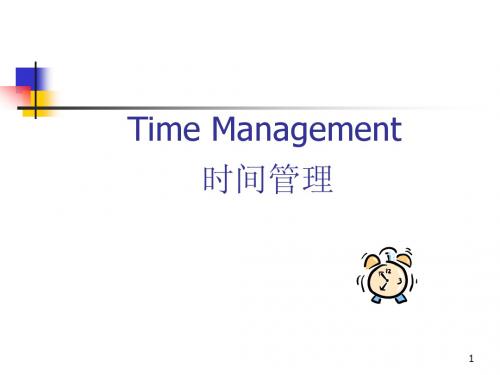
时间管理的概念
时间本身不是问题;
时间管理的问题本身不在于时间,而是在于面对时间
而进行的“自我管理”。
自我管理即是改变习惯,令自己更有效率,更有效果。
把事情很快的做完,叫效率; 把事情很快又很对的做完,叫效果。
7
时间管理的障碍
我的时间安排得挺好,我是一个有序的人 时间管理有什么用,计划赶不上变化 时间掌握在别人手中 时间管理太麻烦 习惯不同,我就这样,不好改 „„„„„„„„„„„„„„
时间控制
23
培养说“不”的能力
说“不”应该有礼貌 要给对方清晰的解释 给对方另外的选择和建议 懂得在适当时候说“不” 建立一套方法和技巧减少打扰 缩短必须要做的事所花的时间 抗拒拖延 求取生活和工作平衡
如果你从来不懂得拒绝工作,导致工作量超出负荷时 你的工作品质势必会大受影响!
正确的时间配置 Put first things first
重要的事情着重在“Plan” “Plan”着重在“Do”
“Do”着重在“Check” “Check”着重在“Action” 重要的事情要逐渐地交给信任的部属,这叫“授权” 大石头
小沙子 水
27
总结
什么是时间杀手?
28
时间杀手的分类
(2). 对时间管理方面,你得到哪些启发?
33
时间是串起过去、现在及未来无数事件的连续线
34
有形 ( 自觉的) 接听电话 打电话 会议 打扰 官僚作风 沟通不足 办公室政治 资源不足 阅读文件及邮件 交通堵塞
29
时间杀手的分类
无形的 ( 不自觉)
1. 欠缺周详计划 2. 不懂分辨缓急先后 3. 过分注重细节 4. 犹疑不决 5. 不懂得说“不” 6. 拖延 7. 善忘 8. 不懂授权 9. 欠缺组织 10. 健康欠佳
time management

Time Management
浪费时间的原因有主观和客观两大方面。
主观原因,是一切的根源。
1. 2. 3. 4. 5. 6. 7. 8. 9. 做事目标不明确。 作风拖拉。 缺乏优先顺序,抓不住重点。 过于注重细节。 做事有头无尾。 没有条理,不简洁,简单的事情复杂化。 事必躬亲,不懂得授权。 不会拒绝别人的请求。 消极思考。
Time Management
麦肯锡30秒电梯理论
麦肯锡公司曾经得到过一次沉痛的教训:该公司 曾经为一家重要的大客户做咨询。咨询结束的时 候,麦肯锡的项目负责人在电梯间里遇见了对方 的董事长,该董事长问麦肯锡的项目负责人:“ 你能不能说一下现在的结果呢?”由于该项目负 责人没有准备,而且即使有准备,也无法在电梯 从30层到1层的30秒钟内把结果说清楚。最终,麦 肯锡失去了这一重要客户。从此,麦肯锡要求公 司员工凡事要在最短的时间内把结果表达清楚, 凡事要直奔主题、直奔结果。麦肯锡认为,一般 情况下人们最多记得住一二三,记不住四五六, 所以凡事要归纳在3条以内。这就是如今在商界流 传甚广的“30秒钟电梯理论”或称“电梯演讲” 。
计划-帮你实现目标
z z z z z z 工作日志 每日计划 每周计划 每月计划 季度计划 年计划
Time Management
工作日志
To Do List
优先度 工作内容 参考信息 起始时间 完成时间 完成检查
Time Management
每日计划
Daily Plan
时间
8:30 9:30 10:30 11:30 12:30 13:30 14:30
Time Management
一些思考
z 培养自己独立工作和解决问题的能力
z 不断更新自己的知识,信息与技巧
时间管理(Time-Management)
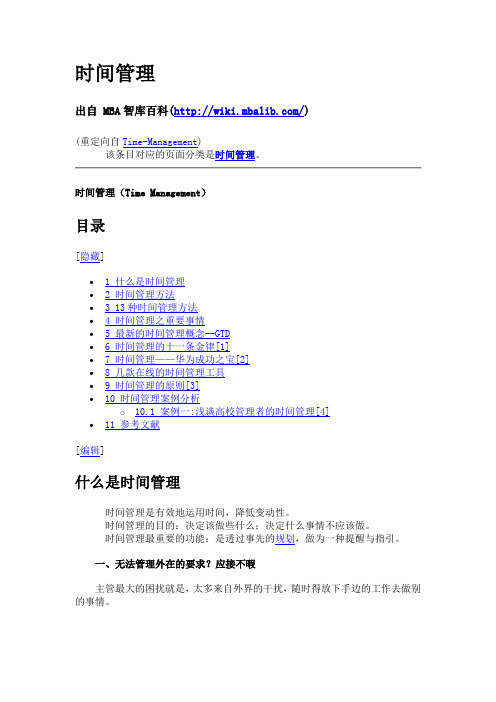
时间管理出自 MBA智库百科(/)(重定向自Time-Management)该条目对应的页面分类是时间管理。
时间管理(Time Management)目录[隐藏]∙ 1 什么是时间管理∙ 2 时间管理方法∙ 3 13种时间管理方法∙ 4 时间管理之重要事情∙ 5 最新的时间管理概念--GTD∙ 6 时间管理的十一条金律[1]∙7 时间管理——华为成功之宝[2]∙8 几款在线的时间管理工具∙9 时间管理的原则[3]∙10 时间管理案例分析o10.1 案例一:浅谈高校管理者的时间管理[4]∙11 参考文献[编辑]什么是时间管理时间管理是有效地运用时间,降低变动性。
时间管理的目的:决定该做些什么;决定什么事情不应该做。
时间管理最重要的功能:是透过事先的规划,做为一种提醒与指引。
一、无法管理外在的要求?应接不暇主管最大的困扰就是,太多来自外界的干扰,随时得放下手边的工作去做别的事情。
担任主管的责任之一就是集合多人的努力,共同完成一份工作。
换句话说,主管的工作有很大的一部份需要与别人互动,外界的干扰是主管工作的一部份。
你可以排定某些时段做为你的工作空挡,当有人临时找你需要讨论事情时,告诉他,你这会儿忙着呢,不急的话儿,在你的空挡时间再来详谈。
时间管理发展得很快,第一代是建立备忘录;第二代就需要事先的计划和准备;第三代会根据你对任务的理解排列优先顺序。
到了第四代,就是分工合作的授权管理。
二、做事没有方法?阅历我们常运用自己所熟悉或直觉想到的方法做事,但事实上,这并不是最有效率的方法。
完成一件事情,可以有许多方法,关键在于你能否找出最快速的方法。
不要毫不考虑的就直接做了,先花几分钟的时间衡量一下,有什么方法可以更有效率的完成事情?三、周围干扰因素?自控周围众多干扰因素,是时间流逝的致命杀手,嘈杂声、杂志、零食、报纸、美容品、温度、安全感、方向感、氛围、性欲、压力、烟瘾、联想、健康状况,都是诸多的影响因素。
[编辑]时间管理方法(一)、计划管理关于计划,有日计划、周计划、月计划、季度计划、年度计划。
时间管理英文什么意思啊

时间管理英文什么意思啊时间管理(Time management)是指通过合理、有效地利用时间,使时间得到充分有效利用,以达到提高工作效率、增强生活品质的目标。
时间管理在现代社会中变得越来越重要,特别是在高强度的工作和生活压力下,合理管理时间可以帮助我们更好地平衡工作和生活,提高个人生产力。
在英文中,时间管理通常被称为Time Management。
Time是时间的意思,Management是管理的意思,结合在一起就是时间管理。
随着全球化的发展,时间管理的概念在世界范围内被广泛接受和使用。
时间管理的重要性时间是有限的资源,每个人一天只有24小时,如何合理利用时间成为人们关注的焦点。
有效的时间管理可以帮助人们更好地组织和安排工作、学习和生活,提高工作效率和生活质量。
时间管理的重要性体现在以下几个方面:提高工作效率合理的时间管理可以帮助我们更好地安排工作时间,合理分配工作任务,充分利用时间来完成工作。
通过制定优先级,合理划分时间,可以提高工作效率,减少工作压力。
避免拖延症拖延症是许多人在工作和学习中常常遇到的问题。
拖延会导致任务无法按时完成,增加工作压力和焦虑感。
通过时间管理,制定明确的计划和目标,可以避免拖延症,提高工作效率。
平衡工作和生活时间管理可以帮助我们更好地平衡工作和生活。
合理安排工作时间和休息时间,调整好工作和生活之间的平衡,可以提高生活质量,减少工作压力,改善人际关系。
增强自我管理能力时间管理需要制定计划和目标,并按计划执行。
通过时间管理,可以培养自我管理能力,提高自律性和自控力。
自我管理能力是成功的重要因素之一,能够帮助我们更好地规划未来,实现个人目标。
时间管理的方法和技巧时间管理涉及到多个方面,以下是一些常用的时间管理方法和技巧:制定计划和目标制定计划和目标是时间管理的基础。
首先要明确自己的目标,然后制定周密的计划和时间表,合理安排任务和活动。
制定计划和目标有助于提高工作效率和时间利用率。
TimeManagement时间管理【中英】
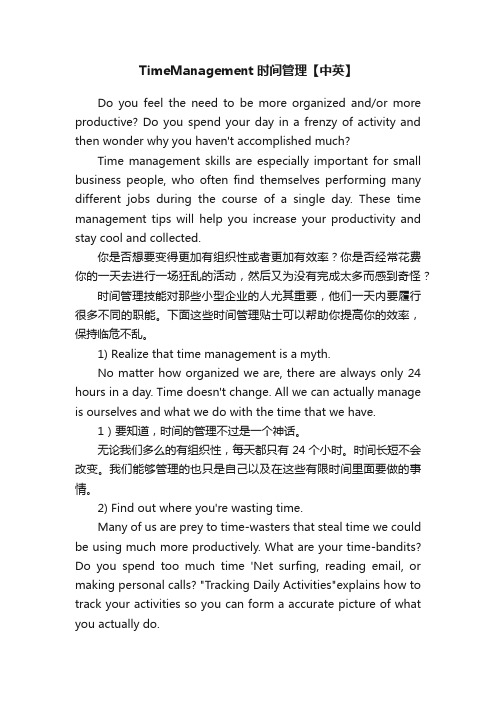
TimeManagement时间管理【中英】Do you feel the need to be more organized and/or more productive? Do you spend your day in a frenzy of activity and then wonder why you haven't accomplished much?Time management skills are especially important for small business people, who often find themselves performing many different jobs during the course of a single day. These time management tips will help you increase your productivity and stay cool and collected.你是否想要变得更加有组织性或者更加有效率?你是否经常花费你的一天去进行一场狂乱的活动,然后又为没有完成太多而感到奇怪?时间管理技能对那些小型企业的人尤其重要,他们一天内要履行很多不同的职能。
下面这些时间管理贴士可以帮助你提高你的效率,保持临危不乱。
1) Realize that time management is a myth.No matter how organized we are, there are always only 24 hours in a day. Time doesn't change. All we can actually manage is ourselves and what we do with the time that we have.1)要知道,时间的管理不过是一个神话。
Time Management

Why
为什么需要时间管理
What
时间管理是什么
How
时间管理的方法
时间管理的重要性
一项国际调查表明:一个效率糟糕的人与一个高效的 人工作效率相差可达10倍以上。
浪费时间的主观原因分析
浪费时间的原因有主观和客观两大方面。这里,我们来分析一下浪费时 间的主观原因,因为,这是一切的根源。 1、做事目标不明确。 2、作风拖拉。 3、缺乏优先顺序,抓不住重点。 4、过于注重细节。 5、做事有头无尾。 6、没有条理,不简洁,简单的事情复杂化。 7、事必躬亲,不懂得授权。 8、不会拒绝别人的请求。
时间管理之麦肯锡30秒电梯理论
凡事要在最短的时间内把结果表达清楚,凡事要直奔 主题、直奔结果。麦肯锡认为,一般情况下人们最多记得 住一二三,记不住四五六,所以凡事要归纳在3条以内。
时间管理十一条金律
金律一、要和你的价值观相吻合 金律二、设立明确的目标 金律三、改变你的想法 金律四、遵循20比80定律 金律五、安排“不被干扰”时间 金律六、严格规定完成期限 金律七、做好时间日志 金律八、理解时间大于金钱 金律九、学会列清单 金律十、同一类的事情最好一次把它做完 金律十一、每1分钟每1秒做最有效率的事情
几款在线的时间管理工具
TeamOffice
Rescuetime
scheduler-lenovo Propelr Tick
时间管理之帕累托原 -----80/20法则
其核心内容是生活中80%的结果几乎源于20%的活动。因此,要把 注意力放在20%的关键事情上 。 • A 重要且紧急(比如救火、抢险等)——必须立刻做。 • B 紧急但不重要——只有在优先考虑了重要的事情后,再来考虑这类 事。人们常犯的毛病是把“紧急”当成优先原则。 • C 重要但不紧急(比如学习、做计划、与人谈心、体检等)——只要 是没有前一类事的压力,应该当成紧急的事去做,而不是拖延。 • D 既不紧急也不重要(比如娱乐、消遣等事情)——有闲工夫再说。
time management 时间管理 最完整

时间管理 第一部分
建立正确的时间管理观念
主要内容: 1、正确理解“时间管理” 2、了解现状 3、时间管理理念的沿革 4、建立正确的时间管理观念
精品课件
时间管理 第一部分
正 确 理 解“ 时 间 管 理 ”
精品课件
时间管理 第一部分
时间是什么
时间对盼望的人来说“实在太短”; 时间对恐惧的人来说“实在太长”; 时间对痛苦的人来说“实在太慢”; 时间对快乐的人来说“实在太快”;
解决有限的时间与有效的事的问题
有限的时间
有效的事
精品课件
时间管理 第一部分
一寸光阴一寸金 平均80岁寿命
1-20、60-80——忽略不计,余40 1年为1寸
项目
每天耗时
40年耗时
结余
睡眠
8小时
一日三餐
2.5小时
交通
1.5小时
电话
1小时
看电视、上网 看报、聊天
3小时 3小时
刷牙、洗脸、洗澡 1小时
休假、白日梦、闹
救命!你在时间管理上需改进
8——12 “yes”
当Hale Waihona Puke !你需要重新审视你的时间 行动指南
4——8 “yes”
可以!方向正确,但需要提高冲劲
0——4 “yes”
恭喜!坚持并保留你的方法
精品课件
时间管理 第一部分
只有一天在工作
---幽默小笑话
一员工向老板请一天假,老板推心置腹地说: “你想请一天假,你在向公司要求什么? 一年里有365天,52个星期。 你已经每星期休息2天,共104天,还剩下261天工作;你每天有16小时 不在工作,去掉174天,还剩下87天;每天你至少30分钟时间上网,加 起来每年23天,剩下64天;每天午饭时间你掉1小时,又用掉46天,还 有18天;通常你每年请2天病假,这样你的工作时间只有16天;每年有 5个节假日公司休息不上班,你只干11天。 每年公司还慷慨地给你10 天假期,算下来你就工作1天,而你他妈的还要请这一天假。。。
Timemanagement时间管理

Timemanagement时间管理Time management时间管理牛国崎作品2019年12月15日时间管理(time management)是指一组织或个人利用特定方法/工具(specific methods/tools)来实现时间的高效利用,从而达到其的整体目标的过程,事实上时间管理亦可狭义地称为自我管理。
本节专题讨论相关表达。
时间管理 Time management.m4a18:58来自云雀梦英语打开今日头条,体验完整音频内容【工匠术语Craftsman’s terms】1. 预设目标 preset goal2. 缓冲时间 buffer time3. 预留时间 reserved time4. 惰性控制 inertia control5. 挑战自我 challenge oneself6. 时间管理 time management7. 无缝对接seamless connection8. 技巧、方法与工具skills, methods and tools【点金用例 Gold touch examples】1. There should be seamless connection between time management and the organizational structure of an enterprise.时间管理和企业的组织架构应实现无缝对接。
【提示】time management 时间管理seamless connection 无缝对接2. Time management combined with self-management can greatly enhance staff performance.时间管理与自我管理相结合可以极大地提高员工绩效。
【提示】staff performance 员工绩效3. Time management consists of three components: task prioritization, inertia control and commitment management.时间管理包含三个子部分:任务优先化,惰性控制和承诺管理。
1 时间管理【Time Management】
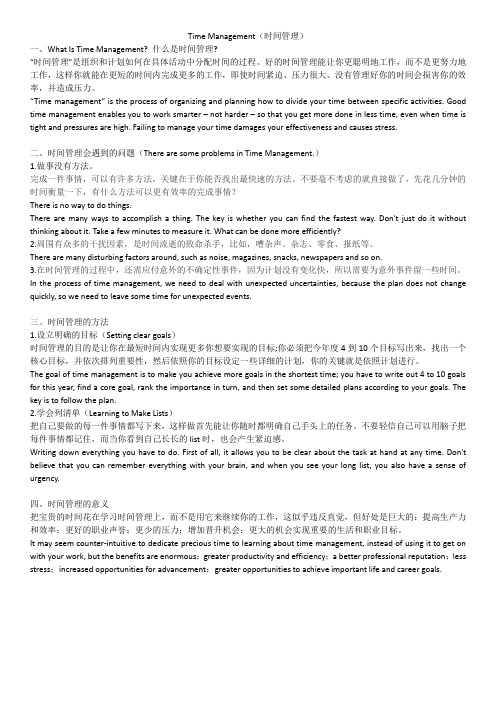
Time Management(时间管理)一、What Is Time Management? 什么是时间管理?“时间管理”是组织和计划如何在具体活动中分配时间的过程。
好的时间管理能让你更聪明地工作,而不是更努力地工作,这样你就能在更短的时间内完成更多的工作,即使时间紧迫、压力很大。
没有管理好你的时间会损害你的效率,并造成压力。
“Time management” is the process of organizing and planning how to divide your time between specific activities. Good time management enables you to work smarter – not harder – so that you get more done in less time, even when time is tight and pressures are high. Failing to manage your time damages your effectiveness and causes stress.二、时间管理会遇到的问题(There are some problems in Time Management.)1.做事没有方法。
完成一件事情,可以有许多方法,关键在于你能否找出最快速的方法。
不要毫不考虑的就直接做了,先花几分钟的时间衡量一下,有什么方法可以更有效率的完成事情?There is no way to do things.There are many ways to accomplish a thing. The key is whether you can find the fastest way. Don't just do it without thinking about it. Take a few minutes to measure it. What can be done more efficiently?2.周围有众多的干扰因素,是时间流逝的致命杀手,比如,嘈杂声、杂志、零食、报纸等。
Time Management

不重要但紧急 不速之客 某些电话 某些信件与报告 某些会议 必要而不重要的问题 受欢迎的活动
不重要又不紧急
最重要的是我们必须常常把最 重要的事列为最重要
The main thing is to keep the main thing the main thing at all times
不知道如何或从何入手 不知道为什么要做? 不喜欢去处理 个人情绪及健康问题 缺乏奖励 没有迫切性 找借口 过分忧虑 忙碌过后
改善拖延方法
问题 文件洗牌 行动 每次只处理一项工作 - 即时去做 - 交付下属去做
- 把工作分成若干部分 - 订出工作时间
著手工作时间
改善拖延方法
建立自信 - 跟自己说 “ 我一定可以做到” 设立目标 找出与自己相关的地方- 对自己的好处 储蓄时间全力再战 自我奖励 设立完工期限 时刻提醒自己事情的重要性 有充分的准备, 才会把事情做好 时间就是金钱
1/改 变 你 的 习 惯 - 行为科学研究表明:一个人一天的行为只有5%是 属于非习惯性的,而95%的行为都是习惯性的。
江山易改,本性难移 !
罗曼· 罗兰名言:性情即命运 !
立 即 行 动 !
2/ 修 正 你 的 态 度 - 时光对有些人像张满的风帆,而对另一些人却像爬 行的蜗牛。
怎样可以增加 你的生产力?
懂得在适当时候说 “ 不” 建立一套方法和技巧减少打扰 缩短必须要做的事所花的时间 抗拒拖延 求取生活和工作平衡
订立计划以掌握时间
运用企划的概念- 拟定计划 订好长期目标, 以及的短期目标 根据目标的轻重, 安排优先次序
搞清楚个人活力周期表, 再根据最有效 的工作时间, 勾勒出“ 理想工作时间表” 以目标, 优先次序, 理想工作时间表表 示这三块积木为基础, 想好一天的计划
企业管理-TimeManagement时间管理

2013/8/20 6
時間管理最重要的18個關鍵(續)
7. 設立一本夢想手冊。 8. 將一年主要目標寫在小卡片上。 9. 重覆寫你的核心目標,一天10遍。 10.時常複習您的目標。 11.找出達成目標最大的障礙(石頭)是 什么? 12.看有誰可以幫你達成目標?
2013/8/20 16
如何有效整理你的桌子(續)
4. 嚴格鑑定所有不丟棄的東西。 5. 大抽屜要有條不紊,檔案要標示清楚。 (95%超過一年的檔案,不會再用到) 6. Input-output(輸入輸出原則) 二個大籃子,一個待辦,一個已處理 OK。
2013/8/20
17
八、靜坐的技巧練習
●做好準備動作
13
時間管理的28個技巧(續)
15. 把每個東西放在固定的位置擺好 16. 把自己的書桌整理乾淨 17. 把最重要的事情完成后再做其他的事情 18. 坐姿會影響效率(想象頹喪與亢奮) 19. 預測未來可能發生的困難或狀況 20. 必頇要有計劃B 21. 在紙上思考(不要只用想的)
2013/8/20 14
11
時間管理矩陣圖
高
任務A 立即處理 任務C 授權他人
高 緊急
任務B 訂下期限/授權 任務D 擱置/扔進紙簍
低
重 要
低
2013/8/20
12
事務分類表
緊急 任務A. ● 危機 ● 急迫的問題 重 要 ● 有期限壓力的計劃 舉例:1.老板或重要客戶到訪; 2. 主要生產設備故障; 3.灰塵影響健 康… 任務C. ● 不速之客 ● 某些電話 ● 某些會議 不 ● 某些信件與報告 重 要 ● 必要而不重要的問題 ● 受歡迎的活動 舉例:1.看電視劇; 2.馬桶坏; 3. 個人交通工具故障、單車車胎坏…
- 1、下载文档前请自行甄别文档内容的完整性,平台不提供额外的编辑、内容补充、找答案等附加服务。
- 2、"仅部分预览"的文档,不可在线预览部分如存在完整性等问题,可反馈申请退款(可完整预览的文档不适用该条件!)。
- 3、如文档侵犯您的权益,请联系客服反馈,我们会尽快为您处理(人工客服工作时间:9:00-18:30)。
The Time Message
This passage mainly talks about the time management for college students. It tells us how precious the time is and how to control it efficiently. I agree on the idea that “Time is the easiest thing in the world to waste—the most difficult to control.”(Excerpt from The Time Message) Sometimes we know we have plenty of time but sometimes it slipping through our fingers unknowingly and quickly. Do not belittle the power of time. We must make good use of it. And the only access is to control it. “Time is dangerous. If we do not control it, it will control us. We must become the master of time, not the servant.”(Excerpt from The Time Message) So how should we control it efficiently? As far as I’m concerned, there are four important aspects for us college students to control it.
Firstly, time is short, and we must make a reasonable plan. We can make a list and write things down in order of priority we need to do. And it is necessary and unavoidable. Perhaps we often think why we cannot use the spare time efficiently, why we cannot accomplish our aim as expected, whytime is so tight sometimes. The main reason is that we do not have a plan. A plan helps us make a good schedule. Then we can systematically arrange our activities according to our schedule.Though we may have difficulty, we can adjust our plan and take care of the special problem properly.What’s more, a good memory is not as good as a pen.We do not need to spend time thinking what should do next and what we haven’t done. We will have confidence when we have a plan in mind.
Secondly, time is finite we must set a practicable goal with time limit.We need to be realistic when set goals. Do not underestimate or overestimate. Otherwise we will fail to accomplish goals as expected and lose our patience.Everything in life is like a challenge, if the challenge is too difficult, we may lose interests; if it is too easy, we do not want to do it. And if it is challenging, it will inspire us to conquer it. When we finish it we feel a sense of achievement.So a feasible goal is important.
Thirdly, time is valuable, and we must control it from beginning.“Time is today, not tomorrow or next week.”(Excerpt from The Time Message)Start our plan from the beginning of a semesterwill be very helpful for us to achieve the goal.If we want to improve our spoken English, we should practice from now on, for instance, listening to the recorder and imitating the intonation. And when it comes to the end of term, we may find our spoken Englishimproves much than before. Time and tide wait for no people. We do it, we get repay; otherwise, we get nothing.
Lastly, persistence is also an important aspect. We cannot do anything successfully without persistence. No matter what we may come across in the middle of doing something, we should never give up. Perseverance is victory.Besides, we should resist the temptations.There are lots of outstanding athletes in the world. They succeeded because they work hard and never give up and they know what they really want. Though the process may not easy, the fruit will be sweet. The time will tell.
In my opinion, the four aspects are most efficient for us to control time and make good use of it.Once we have a goal, we will have the determination to attain it. And it is never too late to control our time.。
